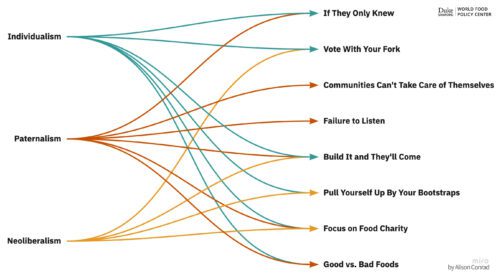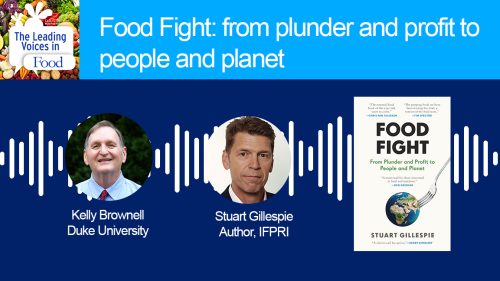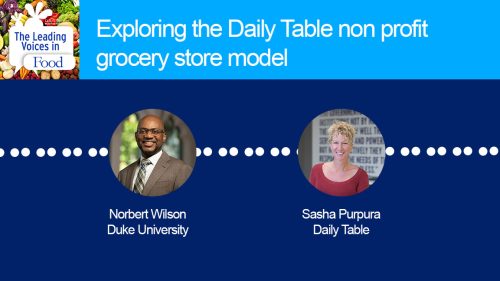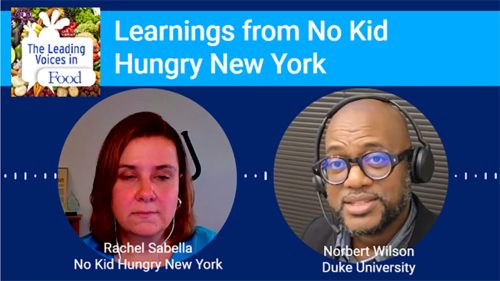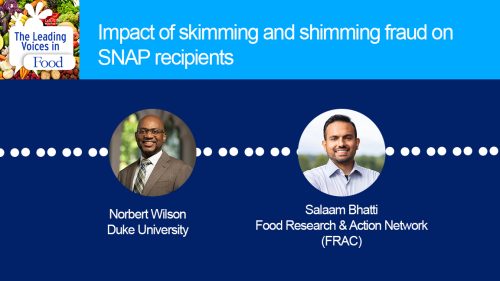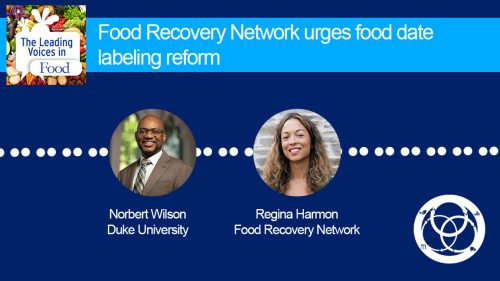The Leading Voices in Food
E94: 8 Ways White Bias Can Misdirect Food System Work
This podcast is part of our series on racial equity in the food system. Today, we’re talking with Alison Conrad, a research associate here at the World Food Policy Center. She has just published a research brief on Identifying and Countering White supremacy Culture in the Food System.
Subscribe: Apple Podcasts | TuneIN | YouTube Music | SoundCloud | PocketCasts | Radio Public
Tags: Equity, Race & Food Justice | Food Insecurity | Food Policy |

Ali Conrad is a Duke University Sanford School of Public Policy Master of Public Policy graduate. Her research focuses on social determinants of health and food access policy. Prior to joining the WFPC, she interned at the Government of District of Columbia Office of the Food Policy Director researching food is medicine in the United States and opportunities in the District for addressing food as a social determinant of health. Before coming to the Sanford School, Ali worked on Medicare Part C and D policy and data analysis at Acumen, LLC after receiving a B.A. in Economics from UC Berkeley. After graduation, she would like to pursue a career working on food policy and its connection to the built environment and social determinants of health issues.
Interview Summary
Big picture. What did your research on white dominant culture in the food system reveal, and why does this matter?
Well, I think first and foremost, it revealed that whiteness and white supremacy are deeply embedded in the food system, but that their presence goes unnamed and unnoticed by white folks. And it’s something that shows up in basic beliefs about the food system. And so you’ll hear some of these narratives that I’ve identified and be like, “Those make sense, “what exactly is wrong about them?” But, in reality, many of these narratives stem from the bigger white supremacy culture that fuels how we discuss what’s happening in the food system, how we want to reform the food system, and what we consider healthy food.
Tell me what you mean by whiteness and white supremacy culture.
Whiteness is a social construct that has very real and violent effects, and it’s not just a reference to lighter skin color, but it’s an ideology that is based on beliefs, values, and behaviors that have resulted in the unequal distribution of power and privilege based on skin color. Whiteness is invisible to those who benefit from it, but it has this immense power because it’s held as a norm. It justifies and binds together the white supremacy system inherent in all institutions of American society. And so as a result, attitudes and behaviors steeped in white supremacy culture can be found in any individual group or organization, whether it’s white-led, predominantly white-led, BIPOC-led, or has a predominantly BIPOC staff.
So Ali, I love that you’ve named some specific narratives that show up. Can you talk about what some of those are?
I identified eight messages, and these may seem really familiar to you, and it’s because many of our core beliefs are driven by a lot of these narratives and they can have an influence on how we go about addressing issues through food policy and programming.
First, I’ll start with If They Only Knew, and this is really about healthy food and cooking education. It’s this idea that if you only knew what healthy food is or how to cook healthy food, then you would go out and buy it and cook it, and therefore be more enlightened and be healthier. It tends to ignore a lot of the more structural issues that come along with what is healthy food and who has access to it?
The next one is Vote With Your Fork, which is this idea that we can somehow signal our preferences for healthy food, for more sustainably grown food, through what we purchase and what we buy.
And next – some more paternalistic narratives – one of which was that Communities Can’t Take Care of Themselves. And this justifies why it’s okay not to involve low income and/or black, indigenous, or people of color, BIPOC, in decision-making around programming and policy.
The next narrative of Failure to Listen draws off of this and shows how institutions, especially funders or government agencies, push solutions onto communities rather than supporting agendas established by individual BIPOC communities themselves.
And next is Build It and They’ll Come. This is a food retail sort of market approach to food access and quote/unquote, “food deserts,” but it doesn’t really address anything around community wealth-building strategies or looking at systemic racism that has to do with what is a food desert and talking about food apartheid.
And next narratives are more focused in neo-liberalism, one of which was Pull Yourself Up By Your Bootstraps. It blames poverty and hunger on the individual—that individuals are just simply not working hard enough to get themselves out of poverty and out of hunger. And because of this, we have the next narrative, which is, a Focus on Food Charity, which results in us over-relying on food distribution and charity as the solution to hunger, instead of thinking about creating more sustainable, structural change, like higher minimum wage, increasing SNAP benefits, and really, anything that just goes beyond food distribution and charity.
Lastly, one that I find very interesting is how we define Good Food Versus Bad Food. And this tends to be more as universally held belief of what is good, healthy food and what is not, and how that can apply with whiteness and white supremacy. So I think it’s really helpful to think of kale versus collard greens as an example. Kale is considered a very common, healthy food. And the other, collards, it’s not often talked about, even though they have the same health benefits. This is because collards were considered the food of the poor Southerner and because of sort of like the classism and the racism of that depiction, collards are not seen on the same level as kale.
So now that I’ve gone through these, you’re probably thinking, “I’ve heard some of these before, and “I believe some of these, what exactly is wrong with them?” They tend to put the emphasis on the wrong place and on the wrong things because they stem from this white supremacy culture that’s focused on the individual; that’s focused on prescribing solutions; that’s focused on this neoliberal idea that it’s only about personal responsibility.
We can’t really move to creating longer lasting change if we’re continually wrapped up in perpetuating these narratives in the policy and programming that we’re doing. We’re coming at it from this lens that’s not focused on long-term change, and is focused on a lot of these bandaids to a bigger problem than say, addressing poverty or racism.
For example, you could take the Vote With Your Fork narrative. It sounds like a great idea. Why can’t we signal to companies that we value more sustainably grown food? But the problem is that it leaves out who is able to participate in that, and why are they unable to participate. You have to have some sort of purchasing power in the first place because if we’re talking about sustainably grown beef–that’s not exactly cheap. And that’s going to leave out anyone who can’t afford to make that purchasing decision, even if they may value more sustainably grown foods. It ignores this idea that maybe we need to come together as a collective to put pressure on the government to pass laws, to regulate companies, and to help move us along to a more sustainably grown local food system.
There’s a lot of nuances that go into these narratives, but you have to start by recognizing how they influence policy and programming, even if you’re not even realizing that you’re doing it, no matter how well-intentioned you might be.
You mentioned food deserts and food apartheid. How are those concepts different?
Thanks for asking this, Jen, I think it’s a really important distinction to make. So food desert is a term that was created by the USDA to define a geographic area without access to grocery stores. The term desert looks at communities from a deficit perspective and it implies that food access and insecurity issues are a natural phenomenon instead of something that was created through generations of divestment. Food apartheid, on the other hand, directs the conversation to systemic racism resulting from policies that created a system where predominantly black neighborhoods on average have fewer grocery stores and poor quality food than predominantly white neighborhoods. And so, food apartheid looks at the food system as a whole and calls out the systemic injustices and inequities that result from racist policies and practices, such as neighborhood redlining. By reframing the issue as food apartheid, food system actors can shift the conversations to systems of injustice in ways to combat them.
So Ali, I’m curious, why did you as a white woman decide to pursue this project?
That’s a really great question. I was worried at first, I will say. I was questioning if I should be the one doing this. As a white person, is this a good place for me? I don’t have that experience with discrimination. What does it mean if I try to take this on? And am I taking up space that someone else should be filling in? But I’ve come to realize that you can’t say, “I’m white, I don’t really have a stake in this,” and therefore it’s on BIPOC individuals “or low income individuals,” or really any group that’s facing discrimination “to advocate for justice and equity.” The point of this project is to say we’re talking about white narratives. We’re talking about systems built on white supremacy, and therefore white folks have to come in and understand how that’s impacted their thought processes, their work, and how they’re putting out policies and programming that then goes on to influence what happens in the food system. Even if you’re not intentionally acting from a white supremacist standpoint, the system is white supremacy, and you have to learn how that whiteness impacts the work that you’re doing.
Going through that myself, going from a place of not really knowing if this is the right thing for me to do as a white person, to understanding that all white people have to do this. Without addressing the part that we play in white supremacy in the food system, you’re not going to understand how that’s influencing the policies and programming you’re putting out. We can’t reform a system that has 400 plus years of white supremacy without confronting white supremacy.
Ali, I really think you’re bringing up a number of critical aspects in terms of how much whiteness shows up in the work around policy and practice in food systems. But also the fact that everyone has a stake in dismantling racism. That this should not be something that is the work of one group or groups, that there is a role for each individual in identifying the aspects of the work that they can do in dismantling racism. I really appreciate you pulling that out, and for that being such an integral part of this research. So I’m interested to know now, what surprised you the most over the course of this research?
Once I had a basis of what the narratives were—I was surprised at seeing how intertwined all of it was. Each individual narrative is really informative, but also looking at them all together and looking at the broader structures of white supremacy culture of that focus on individualism, paternalism, neoliberalism, and seeing how that really is so pervasive in so many types of policy and programming. And now, taking what I’ve learned and going into other conversations and listening—listening to how other people talk about things. Seeing how that white supremacy culture and that approach is just so embedded and that people don’t even realize it. And that if I hadn’t done this project, I also wouldn’t have realized it.
That, in and of itself, is just so helpful to switch the way that you think about things. It is unnamed, and you’re not really gonna notice it until it’s like a light bulb goes on over your head. And you’re like, “Oh wait, that’s problematic,” or, “That just reinforces trauma on communities “that have had 400 years of white supremacy,” “and we don’t even realize that we’re doing it.”
One of the narratives that really sort of resonated with me in this way was this idea of, If They Only Knew. I’ve thought about policies and programs from this If They Only Knew perspective, I’ve definitely been guilty of perpetuating that. And so realizing that was really helpful. It’s not that nutrition education is bad, it just ends up being a replacement for thinking about things like structural inequality that’s inherent in the system. Things such as who is able to access locally grown food, who is able to afford quote/unquote, “healthy fruits and vegetables,” who is able to get transportation to go to the grocery store, and who has time to cook their meals every day.
There’s a lot of these sort of nuances that I think we tend to ignore. And a lot of these things have to do with white supremacy and structural racism that’s built into the system. The problem with these narratives is that they make it easy to ignore the structural issues and asking- Okay, so what will move us to the point where we’re creating a more equitable food system for people to actually access healthy food and more sustainably grown food? And so you really have to start digging into that structural inequality and the racism that creates these disparities. And by just talking about education, you sort of allow yourself to not have to do that.
Ali, you point out how hard it is to see these narratives. I’m curious then, what work needs to happen next for individuals and organizations working to improve the food system once they’re recognizing these white supremacy culture narratives that continue to show up?
Yeah, you make some great points and I’m glad that you’ve asked this question. As I’ve sort of alluded to a little bit, it starts with learning. It’s learning how whiteness is influencing your work. It’s analyzing your thought processes. You can’t really make forward progress if you don’t understand how you might be contributing to the problem. This involves asking yourself some basic questions to challenge how you’re thinking about the food system. So are you discussing at all in your work and in your individual learning how structural racism has impacted the communities you’re serving? Are you moving beyond talking about food access and food deserts to have conversations around food apartheid? Have you looked at your budget, either your organization’s, or even your own personal finances to see if you’re dedicating any money and funding to BIPOC organizations that are already doing work on the ground?
We’ve been socialized to believe a lot about whiteness, about race, about the history of the United States. You really have to start digging in and finding those gaps in your education. You can’t make progress without first learning and unlearning, and then as white folks, as white organizations and institutions, to take action to combat it.
I think it’s important to note that nobody alive today created the current systems of oppression, but they still exist. And many of us benefit from them and perpetuate them. So while we didn’t create the system, I want to acknowledge that some individuals and institutions are today still actively working to strengthen systems of white supremacy and further solidify it in laws and institutions and norms. If we don’t learn how it’s harmful and how we can take action to counteract it, how we’re complicit in it, then we are definitely still complicit in continuing to uphold it.
I think it’s also important to note the power dynamics at play between institutions and communities. Often white institutions and organizations get to come into communities and set the agenda for what is needed and what will happen in those communities. And so organizations need to think about how they can shift from doing the work on behalf of BIPOC communities to supporting community-defined agendas and working with communities. And this really requires organizations to unpack how they are exerting power and influence, and understanding who is benefiting from that power. Is the community really being helped by your programs? Or is your organization the one that’s benefiting from having a program in that community? White institutions and organizations can stifle the ability for BIPOC individuals and communities to use their own power to assert their own agendas, and create systems that benefit them, instead of being forced to participate in systems of oppression.
Related Infographic(s)

